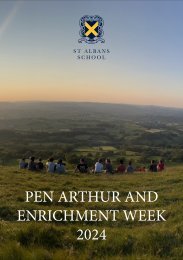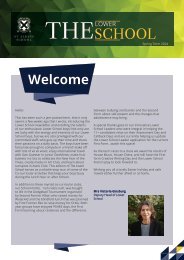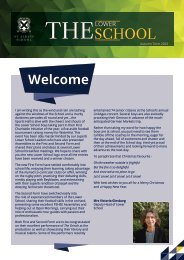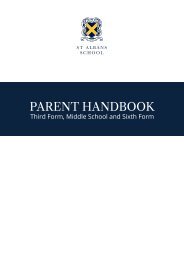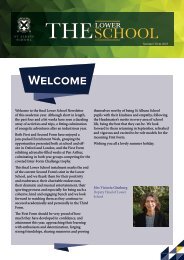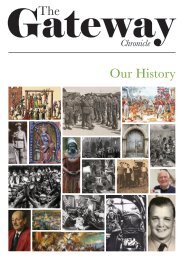You also want an ePaper? Increase the reach of your titles
YUMPU automatically turns print PDFs into web optimized ePapers that Google loves.
Dreamtime which they believed to preordain their<br />
way of life. As living beings, under their religion,<br />
they had to follow the law of the Dreaming and<br />
carry out rituals, which guaranteed the continuance<br />
of their world. The land was believed to originally<br />
have been inhabited by ancestral figures that had supernatural<br />
abilities, which had become the features<br />
on the landscape and natural forces such as wind<br />
and rain. These beliefs were passed down through<br />
various stories which explained the creation of<br />
various different land marks, people, animals, laws<br />
and customs. One such is Uluru (Ayers Rock) in<br />
the Northern Territory, one of Australia’s most<br />
recognisable landmarks, known for its large size<br />
and orange-red colouring. There are many stories<br />
about the formation of Uluru, one being that serpent<br />
beings were in conflict around the rock which<br />
scarred it. It was seen by the Aboriginal Australians<br />
as a sacred site, known as a resting place for the<br />
ancient spirits that used to inhabit the area during<br />
the Dreaming. The area has a rich history and cave<br />
paintings can still be found within it dating back<br />
thousands of years. Various other sites of religious<br />
importance exist across Australia and demonstrate<br />
the links that various groups had across such a<br />
87<br />
Hidden Voices<br />
large area, but also the diversity of explanations<br />
attributed to various features on the land.<br />
The impact on Aboriginal Australian society of colonialism<br />
by the British Empire was profound. British<br />
colonialism began with the transportation of<br />
criminals to Australia, with the first fleet of ships<br />
arriving in 1788. For the next 150 years, criminals<br />
as well as regular settlers would migrate Australia<br />
and move further inland, bringing their livestock,<br />
crops and guns. Resultantly, from 1788 to 1900, the<br />
Aboriginal population had reduced by 90% due to<br />
disease, loss of important land and direct conflict<br />
with settlers. The initial waves of settlement had<br />
pushed them off vital areas of resources and monopolised<br />
them for their own means, such as water<br />
sources for the use of cattle ranching. This left<br />
groups of Aboriginals with nowhere to collect food<br />
and water, and they were also pushed off the land<br />
into areas that were not generally suitable to settle<br />
where food and water were scarce. Their traditional<br />
patterns of travel, land management, hunting and<br />
gathering were all interrupted which were vital to<br />
their semi-nomadic lifestyle, while sacred sites were<br />
blocked off meaning that no cultural and religious<br />
exchange could take place. Inevitably, from the actions<br />
of the settlers in forcing the Aboriginal Australians<br />
off the land, conflict arose due to the lack<br />
of resources. Aboriginals were left with little choice<br />
but to try to steal food from settler communities, or<br />
attack their livestock to halt their advance in order<br />
to survive. However, settlers quickly reacted with<br />
reprisals, which didn’t just target the perpetrators<br />
of these actions. They went further by also massacring,<br />
terrorising and chasing Aboriginal communities<br />
indiscriminately using the ‘Native Police’.<br />
It is estimated that at least 20,000 died as a direct<br />
result of this conflict. Contemporary sources even<br />
regarded this as a brutal and blatant land grab by<br />
European settlers. A Commons Select Committee,<br />
producing a final report on native people within the<br />
empire in 1837, stated:<br />
“It might be presumed that the native inhabitants of any<br />
land have an incontrovertible right to their own soil: a<br />
plan and sacred right, however, which seems not to have<br />
been understood. Europeans have entered their borders<br />
uninvited, and, when there, have not only acted as if they<br />
were undoubted lords of the soil, but have punished the<br />
natives as aggressors if they have envinced a disposition<br />
to live in their own country”<br />
The ability of the British Empire to recognise the




